Coursefinder40
On this page, you find all documents, package deals, and flashcards offered by seller CourseFinder40.
- 290
- 0
- 26
Community
- Followers
- Following
7 Reviews received
320 items
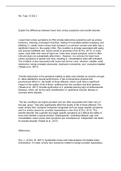
NUR 631 Topic 12 Discussion Question 2
NUR 631 (Advanced Physiology & Pathophysiology) Topic 12 Discussion Question 2 Select two of the following discussion questions for your discussion response. Indicate which questions you have chosen using the format displayed in the “Discussion Forum Sample.” Explain the differences between lower tract urinary symptoms and erectile disorder. A patient presents with flank pain. You suspect renal calculi. What is the pathophysiological reason for development of renal calculi and associ...
- Package deal
- Other
- • 3 pages •
NUR 631 (Advanced Physiology & Pathophysiology) Topic 12 Discussion Question 2 Select two of the following discussion questions for your discussion response. Indicate which questions you have chosen using the format displayed in the “Discussion Forum Sample.” Explain the differences between lower tract urinary symptoms and erectile disorder. A patient presents with flank pain. You suspect renal calculi. What is the pathophysiological reason for development of renal calculi and associ...
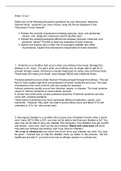
NUR 631 Topic 12 Discussion Question 1
NUR 631 (Advanced Physiology & Pathophysiology) Topic 12 Discussion Question 1 Select two of the following discussion questions for your discussion response. Indicate which questions you have chosen using the format displayed in the “Discussion Forum Sample.” Explain the concept of azotemia (including prerenal, renal, and postrenal), causes, and diagnostic measures used to identify each. Explain the pathophysiological differences between prerenal, intrarenal, and postrenal failure? P...
- Package deal
- Other
- • 2 pages •
NUR 631 (Advanced Physiology & Pathophysiology) Topic 12 Discussion Question 1 Select two of the following discussion questions for your discussion response. Indicate which questions you have chosen using the format displayed in the “Discussion Forum Sample.” Explain the concept of azotemia (including prerenal, renal, and postrenal), causes, and diagnostic measures used to identify each. Explain the pathophysiological differences between prerenal, intrarenal, and postrenal failure? P...
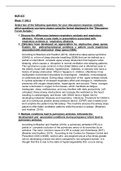
NUR 631 Topic 11 Discussion Question 2
NUR 631 (Advanced Physiology & Pathophysiology) Topic 11 Discussion Question 2 Select two of the following discussion questions for your discussion response. Indicate which questions you have chosen using the format displayed in the “Discussion Forum Sample.” Discuss the differences between respiratory acidosis and respiratory alkalosis. Provide a case study or presentation associated with respiratory acidosis or respiratory alkalosis.Discuss the differences between respiratory acidos...
- Package deal
- Other
- • 2 pages •
NUR 631 (Advanced Physiology & Pathophysiology) Topic 11 Discussion Question 2 Select two of the following discussion questions for your discussion response. Indicate which questions you have chosen using the format displayed in the “Discussion Forum Sample.” Discuss the differences between respiratory acidosis and respiratory alkalosis. Provide a case study or presentation associated with respiratory acidosis or respiratory alkalosis.Discuss the differences between respiratory acidos...
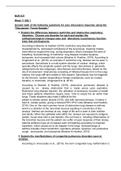
NUR 631 Topic 11 Discussion Question 1
NUR 631 (Advanced Physiology & Pathophysiology) Topic 11 Discussion Question 1 Select two of the following discussion questions for your discussion response. Indicate which questions you have chosen using the format displayed in the “Discussion Forum Sample.” Explain the differences between restrictive and obstructive respiratory disorders. Choose one disorder for each and explain the pathophysiological changes seen and alterations in pulmonary function tests that aid diagnosis. Expl...
- Package deal
- Other
- • 2 pages •
NUR 631 (Advanced Physiology & Pathophysiology) Topic 11 Discussion Question 1 Select two of the following discussion questions for your discussion response. Indicate which questions you have chosen using the format displayed in the “Discussion Forum Sample.” Explain the differences between restrictive and obstructive respiratory disorders. Choose one disorder for each and explain the pathophysiological changes seen and alterations in pulmonary function tests that aid diagnosis. Expl...
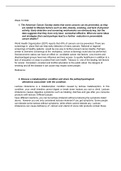
NUR 631 Topic 10 Discussion Question 2
NUR 631 (Advanced Physiology & Pathophysiology) Topic 10 Discussion Question 2 Answer both of the following discussion questions for your discussion response. The American Cancer Society states that some cancers can be prevented, as they are related to lifestyle factors such as diet, obesity, smoking, and lack of physical activity. Early detection and screening mechanisms are obviously key, but the data suggests that they have only been somewhat effective. What are some ideas and strategi...
- Package deal
- Other
- • 2 pages •
NUR 631 (Advanced Physiology & Pathophysiology) Topic 10 Discussion Question 2 Answer both of the following discussion questions for your discussion response. The American Cancer Society states that some cancers can be prevented, as they are related to lifestyle factors such as diet, obesity, smoking, and lack of physical activity. Early detection and screening mechanisms are obviously key, but the data suggests that they have only been somewhat effective. What are some ideas and strategi...
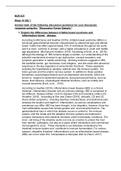
NUR 631 Topic 10 Discussion Question 1
NUR 631 (Advanced Physiology & Pathophysiology) Topic 10 Discussion Question 1 Answer both of the following discussion questions for your discussion response. Explain the differences between irritable bowel syndrome and irritable bowel disease. Gastric cancers require meticulous management. Choose a gastrointestinal cancer that is primary sourced in an organ of the gastrointestinal system and discuss the epidemiological characteristics and pathological ramifications of the condition.
- Package deal
- Other
- • 2 pages •
NUR 631 (Advanced Physiology & Pathophysiology) Topic 10 Discussion Question 1 Answer both of the following discussion questions for your discussion response. Explain the differences between irritable bowel syndrome and irritable bowel disease. Gastric cancers require meticulous management. Choose a gastrointestinal cancer that is primary sourced in an organ of the gastrointestinal system and discuss the epidemiological characteristics and pathological ramifications of the condition.

NUR 631 Topic 10 Assignment: CLC Gastrointestinal Case Study
NUR 631 (Advanced Physiology & Pathophysiology) Topic 10 Assignment 1: CLC – Gastrointestinal Case Study PowerPoint This is a Collaborative Learning Community (CLC) assignment. Working in teams and collaboration is an essential skill that is prevalent in clinical situations. In this assignment, you will be working in a group to create a PowerPoint to address the gastrointestinal case study provided below. The instructor will divide the class into CLC groups. The PowerPoint should be 12-...
- Package deal
- Other
- • 14 pages •
NUR 631 (Advanced Physiology & Pathophysiology) Topic 10 Assignment 1: CLC – Gastrointestinal Case Study PowerPoint This is a Collaborative Learning Community (CLC) assignment. Working in teams and collaboration is an essential skill that is prevalent in clinical situations. In this assignment, you will be working in a group to create a PowerPoint to address the gastrointestinal case study provided below. The instructor will divide the class into CLC groups. The PowerPoint should be 12-...
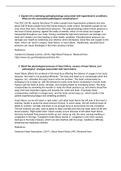
NUR 631 Topic 9 Discussion Question 2
NUR 631 (Advanced Physiology & Pathophysiology) Topic 9 Discussion Question 2 Select two of the following discussion questions for your discussion response. Indicate which questions you have chosen using the format displayed in the “Discussion Forum Sample.” Explain the underlying pathophysiology associated with hypertensive conditions. What are the associated pathological complications? Detail the physiological process of heart failure, causes of heart failure, and pathological chan...
- Package deal
- Other
- • 2 pages •
NUR 631 (Advanced Physiology & Pathophysiology) Topic 9 Discussion Question 2 Select two of the following discussion questions for your discussion response. Indicate which questions you have chosen using the format displayed in the “Discussion Forum Sample.” Explain the underlying pathophysiology associated with hypertensive conditions. What are the associated pathological complications? Detail the physiological process of heart failure, causes of heart failure, and pathological chan...
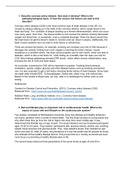
NUR 631 Topic 9 Discussion Question 1
NUR 631 (Advanced Physiology & Pathophysiology) Topic 9 Discussion Question 1 Select two of the following discussion questions for your discussion response. Indicate which questions you have chosen using the format displayed in the “Discussion Forum Sample.” Describe coronary artery disease. How does it develop? What is the pathophysiological basis of how the various risk factors can lead to this disorder? Numerous hormones have an impact on cardiac function. List two to three of the...
- Package deal
- Other
- • 2 pages •
NUR 631 (Advanced Physiology & Pathophysiology) Topic 9 Discussion Question 1 Select two of the following discussion questions for your discussion response. Indicate which questions you have chosen using the format displayed in the “Discussion Forum Sample.” Describe coronary artery disease. How does it develop? What is the pathophysiological basis of how the various risk factors can lead to this disorder? Numerous hormones have an impact on cardiac function. List two to three of the...
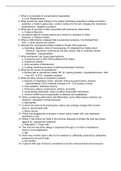
NUR 631 Midterm Exam with Answers
NUR 631 (Advanced Physiology & Pathophysiology) Midterm Exam with Answers Questions What is an example of compensatory hyperplasia? What causes the rapid change in the resting membrane potential to initiate and action potential. a. Sodium gates open, sodium rushes into the cell, changing the membrane potential from negative to positive. What type of necrosis is often associated with pulmonary tuberculosis. Low plasma albumin causes edema as a result of a reduction in which pressure. ...
- Package deal
- Exam (elaborations)
- • 4 pages •
NUR 631 (Advanced Physiology & Pathophysiology) Midterm Exam with Answers Questions What is an example of compensatory hyperplasia? What causes the rapid change in the resting membrane potential to initiate and action potential. a. Sodium gates open, sodium rushes into the cell, changing the membrane potential from negative to positive. What type of necrosis is often associated with pulmonary tuberculosis. Low plasma albumin causes edema as a result of a reduction in which pressure. ...

NURS 6052 Module 2 Quiz: Is it Quantitative, Qualitative, or Mixed Methods
NURS 6003 Module 6 Assignment: Academic Success and Professional Development Plan Part 6 - Finalizing the Plan
NURS 6003 Module 1 Assignment, Academic Success and Professional Development Plan Part 1 – Developing an Academic and Professional Network
PSY 7713 (Behaviour Analytic Interventions) – Quiz 1 Unit 5 with Answers – 92 out of 100 points
PSY 7713 (Behaviour Analytic Interventions) - Quiz 1 Unit 3 with Answers - 100 out of 100 points